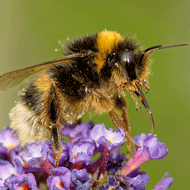
One of the UK’s most-used pesticides, chlorothalonil, is set to be banned in the EU amid concerns about human health and the environment, reports say.
EU states voted for a ban on the fungicide, which prevents mildew and mould on crops, following a review by the European Food Safety Authority (Efsa), according to a report in The Guardian.
Efsa said it could not exclude the possibility that the breakdown products of the chemical cause DNA damage, and a ‘high risk to amphibians and fish was identified for all representative uses’.
Recently, research also found chlorothalonil and other fungicides are the strongest factor linked to serious bumblebee declines.
A European commission spokeswoman is quoted by The Guardian as saying: “The [chlorothalonil ban] is based on Efsa’s scientific assessment which concluded that the approval criteria do not seem to be satisfied for a wide range of reasons.
“Great concerns are raised in relation to contamination of groundwater by metabolites of the substance.”
The spokeswoman is reported to have said the ban will be passed in late April or early May, coming into force three weeks later.



 The RCVS has announced a new version of its 1CPD mobile app, with enhanced features for veterinary surgeons and veterinary nurses to record their continuing professional development.
The RCVS has announced a new version of its 1CPD mobile app, with enhanced features for veterinary surgeons and veterinary nurses to record their continuing professional development.